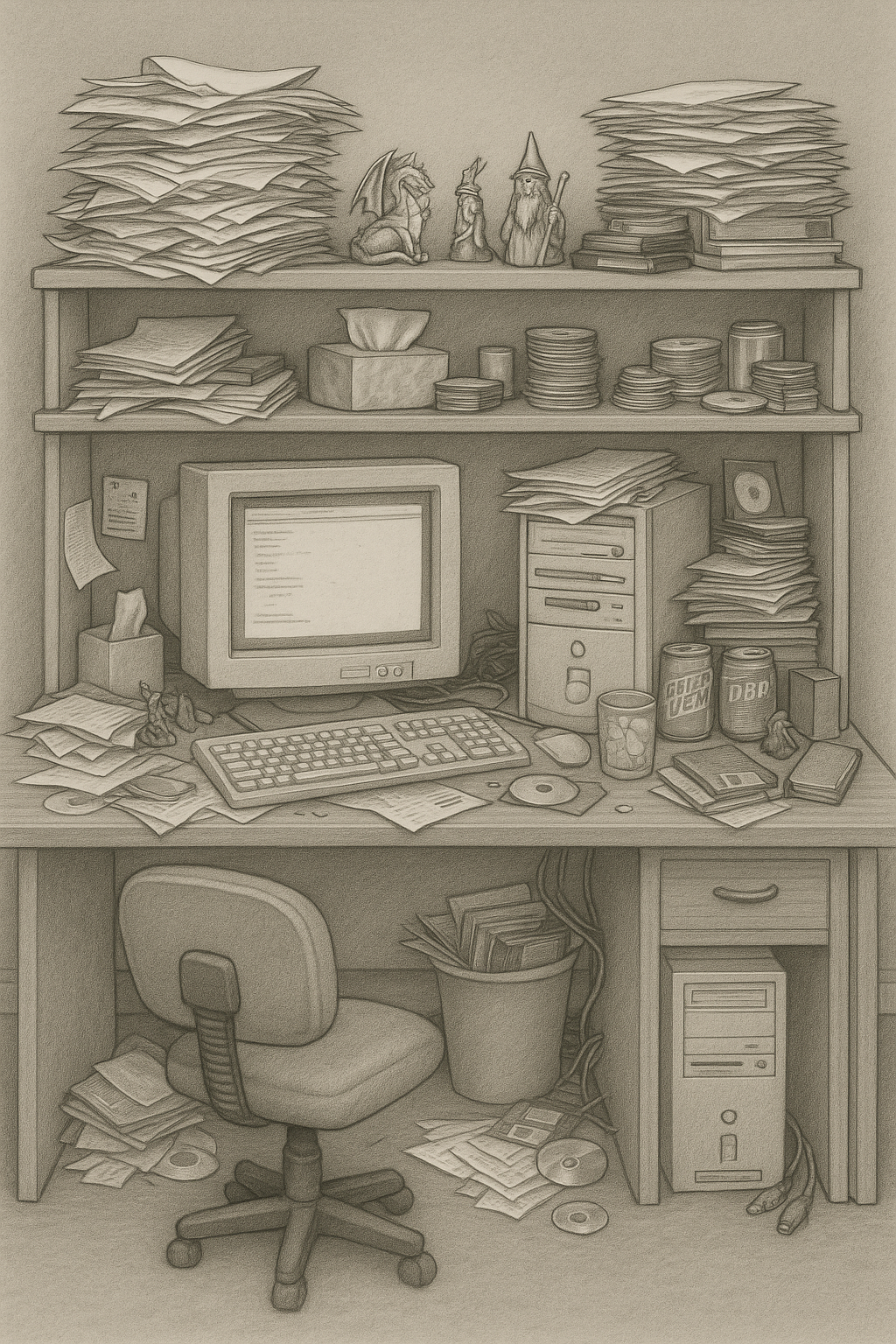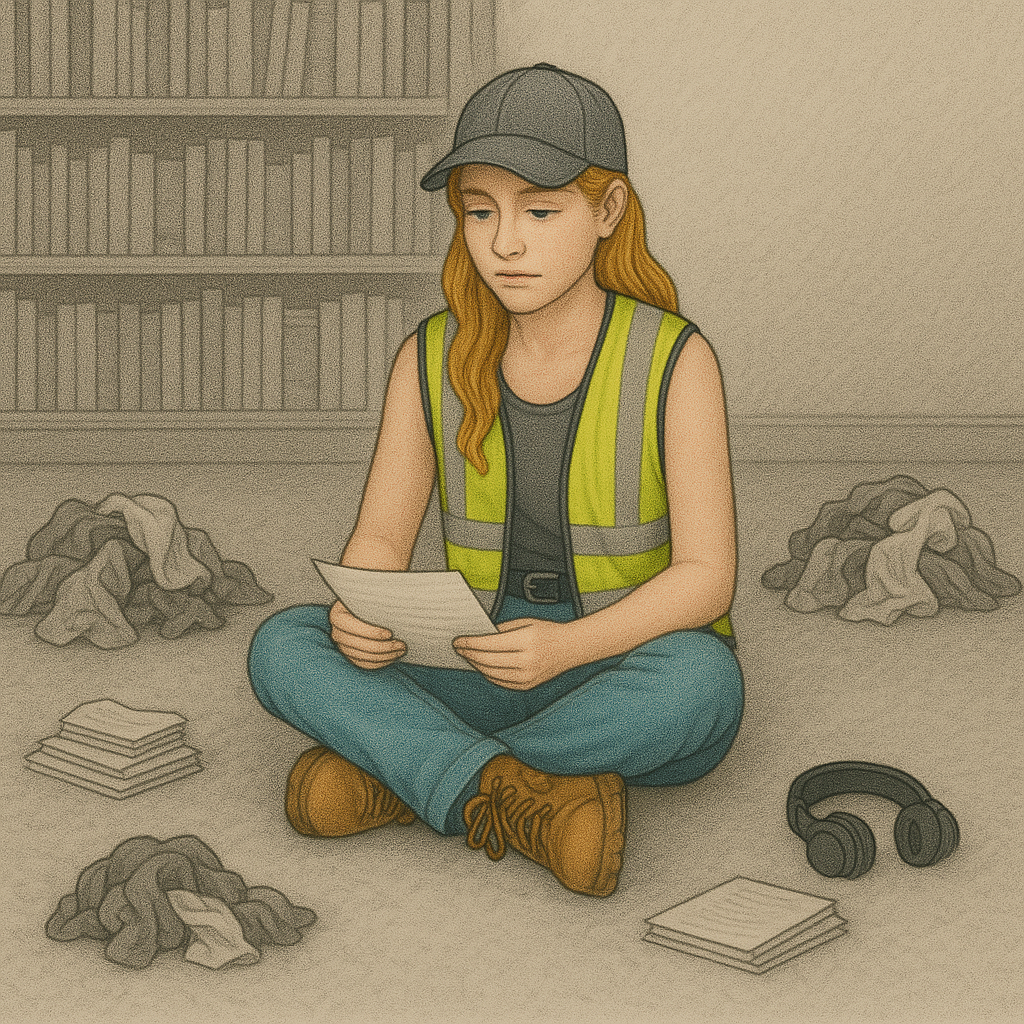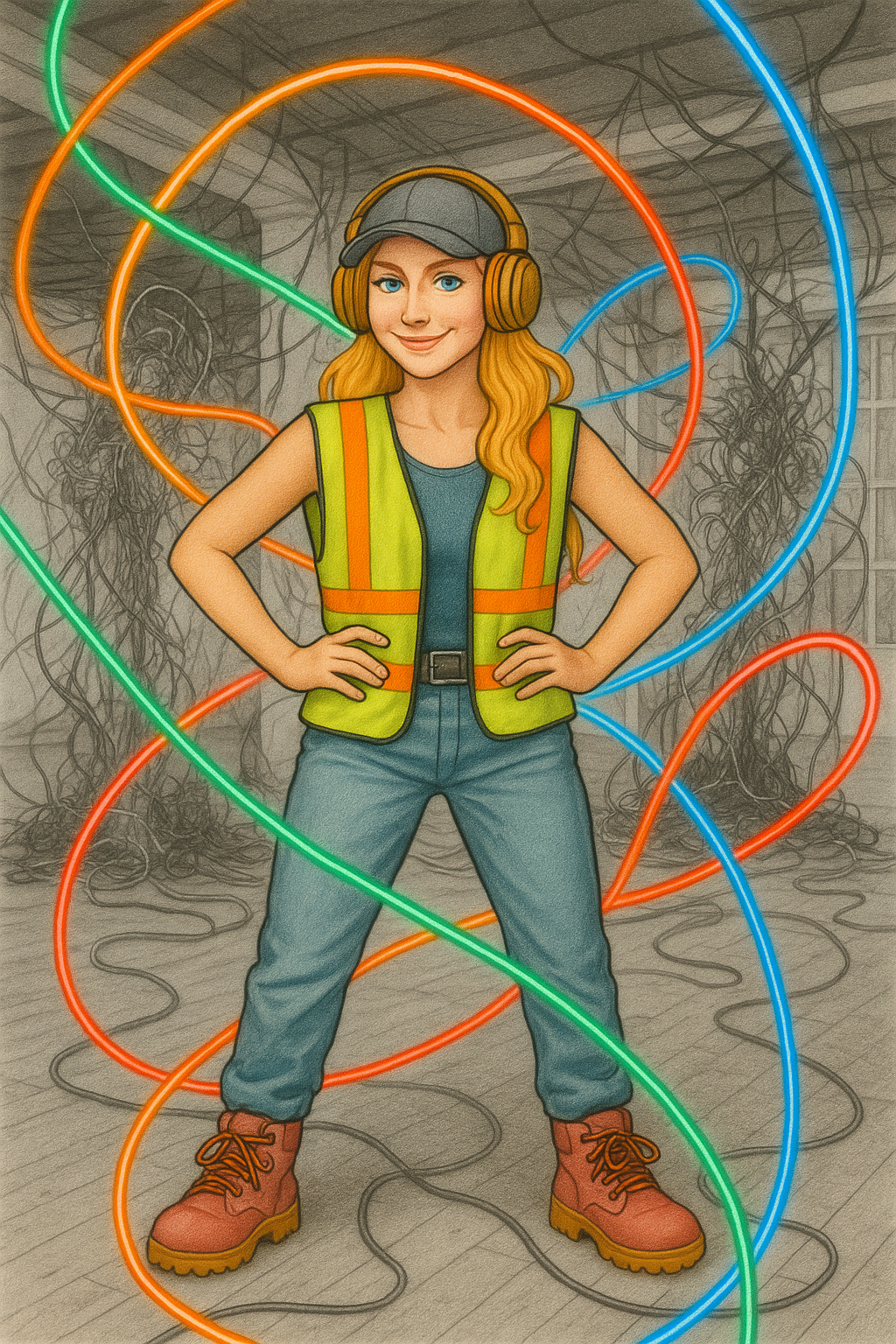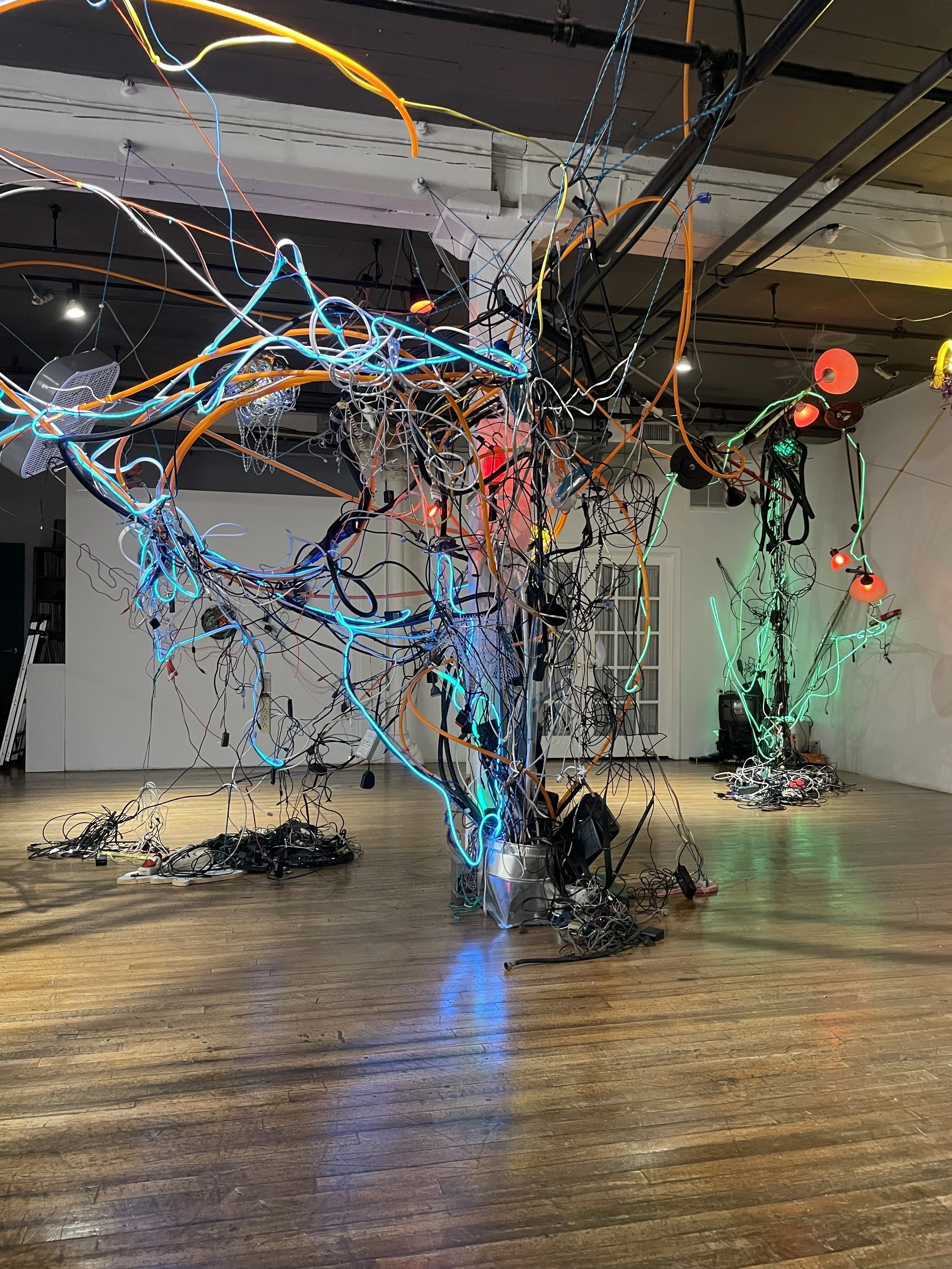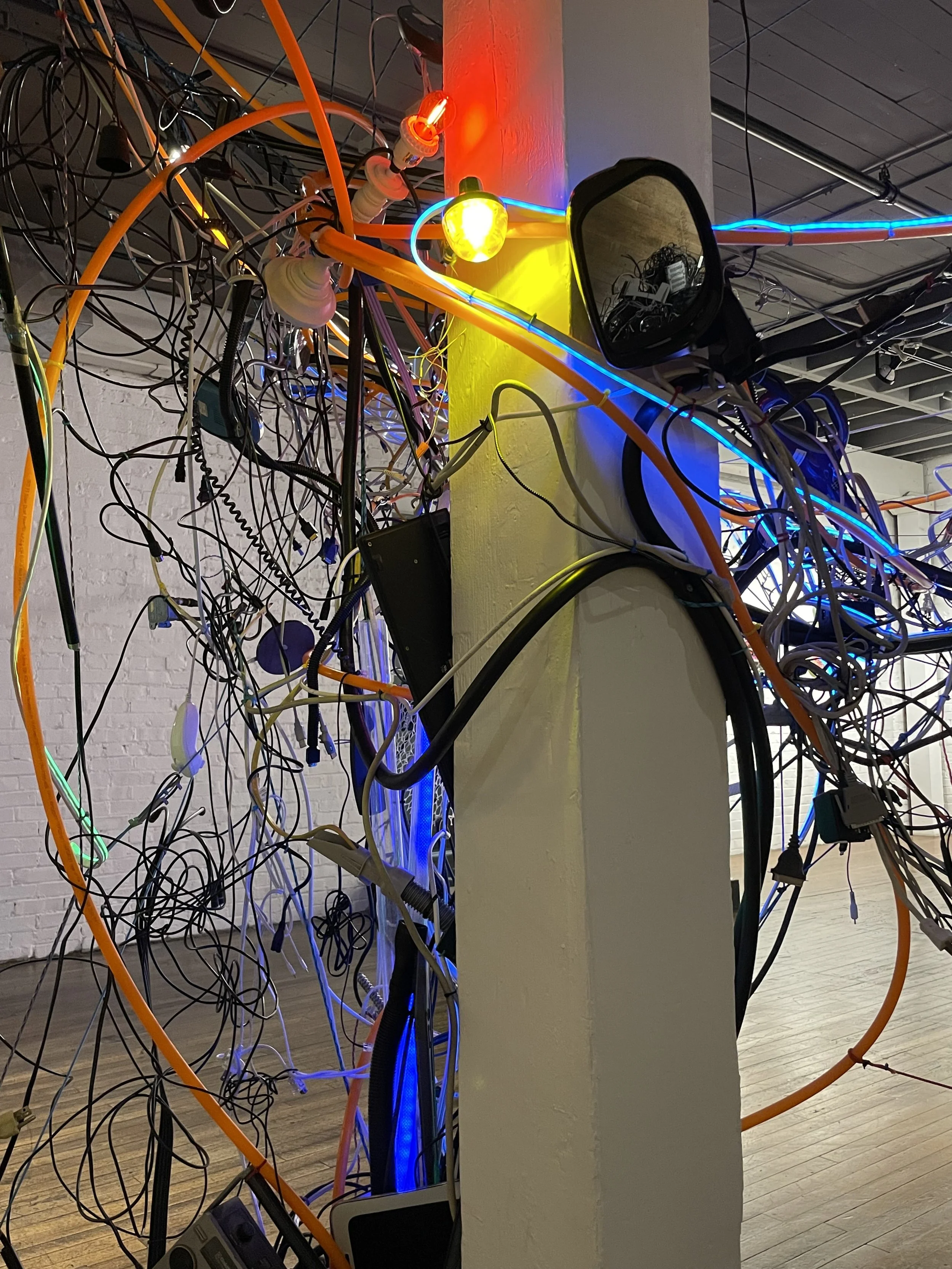Entry 3: Wired for Survival
7/18/2025
NOTES FROM THE BALCONY, ENTRY #3
What my father never taught me, I learned anyway.
The opening reception for Technologic is tomorrow. It's at the Contemporary Arts Center of Peoria, a place that feels like returning home because I went to undergrad at Bradley and lived there in my late teens/early twenties. It was a good time in my life (I spent a summer in Spain and a semester in Italy, learned to meditate, made lifelong friends), though the seams were ripping at home between my parents (my dad lost his job in 2008 when the housing market crashed, and both my parents had spending problems so money was a huge source of tension, and they would fight pretty openly about just about anything). I remember the way bills would pile up, then my mom would eventually spend a whole afternoon tearing through them, sorting them, then saying something to her friends over the phone about "robbing Peter to pay Paul". I am learning as an adult how to be more financially literate than my parents, yet I find myself making silly mistakes even now. It's always a "could have done this or that....damn..."-type of regret. Like my most recent project, when I realized I should have budgeted for assistants because it turned out that client definitely had the money, but there I was -like usual- slaving away by myself frantically. Lonely. No roadie. Just me and the ghosts of my mentors riding shotgun. Why hadn't I learned yet?Lately, the difference I see is that I grant myself some patience and grace, and remind myself that at age 35 (okay...almost 36) I am still a young grasshopper just learning the ropes. Especially in the world of entrepreneurship. I think at least that is what business and social media tycoon Gary Vee would say. (If you don't know who he is, click here.) This is what I remind myself when my son's father tells me I'm worthless, that I am far from achieving my goals, and that I am nothing special. I choose to tune him out and still believe in myself, which is actually the hardest thing to do when you don't have supports around you in the form of family, when you are drowning in bills, and all you can think of is taking yourself out of the whole scenario entirely.I still need to pack a little bag for my trip, but have a million other things to do first. I need to write labels for my show and prep work that I plan on swapping out with some pieces that have already sold. I need to mail out a commission. I also need to clean my stove. Right now, I am surrounded by kids' toys, diapers, shoes, and other things I'd learned to hide as part of a signifier to my identity years ago. Being a mother meant being weak, vulnerable it seemed (to the art world, and to my colleagues in grad school). Being a single mother is even worse, because it implies some sort of loss, whether by death or by rejection or some other means...the man who created that baby with her is not around. So what label does the single mom have to wear?—
-Masking that part of me became a strategy for survival among peers, and I got so good at it on the outside, people sometimes forgot I even had kids. On the inside, though, I was aching to find a way to merge those parts of myself: the strong woman so sure of her work and passions, with the vulnerable single mother, desperate to pull through each day, the one who loves her kids tremendously. For years, I have played the role of both hunter and gatherer, in addition to soldier (warrior?), artist, vixen, and so much more. I am pretty sure that I am not whatever the world expects me to be. The more observing I do, the more I notice that the very structures I have created to survive, the various roles I must simultaneously play are a detriment to me in the end. If I let it all show at once, isn't it like Mulan showing her chi? A woman who is a mother and also deeply involved in her career-- working alongside construction tradesmen, engineers, architects, and tech bros. Women are scarce on most job sites, and when they are present usually they are the corporate people, not the ones doing grunt labor. There is a difference between walking around wearing a construction hat and physically working while wearing that same hat. Those of us with our feet on the floor give each other a knowing nod. Like Jeep drivers, or motorcyclists.I’ll be driving back to Peoria early in the morning, back to where I studied art for the first time on a serious level. Back to the place where I once believed that if I just worked hard enough, and did things well enough, someone would show up. That someone would recognize the spark in me and choose to protect it. Some people did, but mostly it was me protecting myself (and truthfully I did not realize this until today).
I chased mentors my whole life. Mrs. Claxton in 5th grade — the first to call me an artist, the first to buy me real supplies with her own money: a thick sketchbook, graphite pencils, two erasers (one rubber, one gum), and a blending stick I treated like gold. She told my parents to have me practice drawing outside of class; she thought I was gifted. When I brought back the oversize sketchbook, she took it home and, rather than giving me grades, she gave me post-it notes all over the margins with praise and helpful suggestions. Early validation. Then there were Mr. Divis and Mr. Paluga in high school, among a few others. And later, Gillespie, Greene, Brammeier, Warwick — professors whose approval I craved so badly, and a handful of others because it would be too many to name. This trend continued on through grad school for me. For some of us, when the adults in your life don't do their due diligence to know and understand your spirit, you start collecting others — the ones who see you, who teach you, who stand in the gap. This started with my grandmother, and branched out to include teachers and friends' parents.
The art in this show is built from discarded electronics — broken keyboards, coiled wires, obsolete software, bundled cables, and more. It’s work that began in my heart decades ago. If you want to see a couple photos from that show, scroll down to the end of this post.-When I was a little girl growing up in 90s suburbia, I watched my dad enmesh himself fully in the tech wave of that era. He was hacking code, writing code, building websites, burning CDs and DVDs (we had a bootleg copy of every decent movie we ever rented from Blockbuster). We always had the newest version of Windows and the fastest dial-up internet. He was swimming in floppy disks, cords, and tech magazines way before my material fascination ever started. I sometimes think I replaced the longing for my father's attention with a tender affection toward the objects he seemed to care about so much more than his family. Technology. Beyond his ability to build a whole computer from scratch, my dad was smart enough and skilled enough to do the same with most cars. He even used to run an auto shop back in the day, before I was born. So imagine my surprise when he would later poke fun at my junky car, the car I used to take my daughter to her doctor appointments in the city, or my other daughter to therapy, or for me to work. The car that was our humble lifeline. What my heart wished for was a dad who would help me, the same way I saw my friends' parents helping them, or even my mentors helping their own kids. The one time they recently helped me with a flat tire, I was told exactly how much it all cost them, and that it would be coming out of my "Christmas gift" (more on Christmas trauma when that season comes around-yay!).
One afternoon, I was outside in the rain, frantically pulling fuses after getting my father on the phone, trying to stop my car radio from draining the battery overnight. No idea why, but that crazy head unit decided it just wouldn't ever turn off. It felt like my little car was betraying me, like it was tired, like it was mad that I didn't get all the latest work up-to-date. After all, we had been together almost ten years, through many trips and many emotions. It was one thing in a series of problems my car was suddenly having, and I was at the end of my rope. Crying. Knees soaked through. The phone rings. He actually picks up, sounds groggy. I tell him what is going on, I tell him what I am trying to do, and he laughs as he walks me through it. We get off the phone. A couple days later I get a text, following up on the car. I was living in a brief fantasyrealityland, thinking he might get in his own car and drive the half hour to help me that day, especially knowing I had my kids upstairs waiting for me, or even just to show up to offer assurance that I wasn't alone. A hug can be everything, don't you think?Technologic as an exhibition is really about traversing the landscape of my memory. About love and loneliness, and refusing to be thrown away. It is about trash as a concept, and why some things (just as people) get rejected. As kids, we all had weekly house chores. Mine included vacuuming the whole house and emptying every small garbage can into one large garbage bag, then hauling it outside to the main receptacle. Every room had a can: 7 cans upstairs and 4 cans downstairs. The one I always saved for last, the one I dreaded most (even worse than the bathroom garbages), was the can under my dad’s computer desk. It reeked of chewing tobacco and crushed soda cans. Even to this day, I have never smoked a cigarette and cannot stand the smell of tobacco. Strewn across all the surfaces of his desk were papers, floppies, notes, knick-knacks (medieval castles, dragons, model cars), and empty cans of Mountain Dew. It smelled like his sweaty flannel shirt thrown over the computer chair. But it was a trace of him, my dad. He was cruel to my mom, but he was still mine. He mostly ignored us, but he was still mine. He had major addictions, but I still thought he was so smart, so capable, and yes...still mine. My dad. It hurt to see him like this.I find traces of him in everything I build now, in every piece of trash I pick up and save from destination: dump. My mom is on my mind a lot too-- the painter, crafter, ceramicist. I think of how they both let their passions die, without even putting up a fight. I think about how I will make art forever, even if you chop off my hands, as long as I still have my brain. I rebel, and I let old family patterns fall away with each cut and pull of the material.I do think trauma has robbed me of many happy memories. But not all of them. Some survived. Some refused to be forgotten. Some were threaded into sculptures. Pressed between pages. Hung on gallery walls. Hung in Peoria.
Tomorrow I'll be there in the spirit of celebration. I will raise a glass to the Art that has carried me this far, in the place where it first revealed its power. That Art could hold me, even when no one else did, was a revelation. One that I am still trying to get used to, but I keep being reminded.Technologic, Contemporary Arts Center of Peoria
Technologic, Contemporary Arts Center of Peoria (detail)
